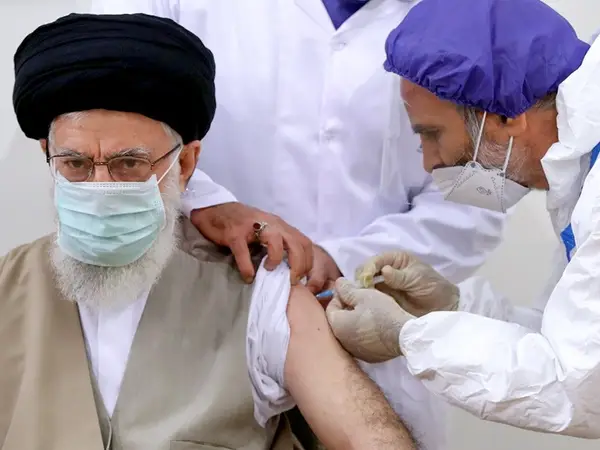In an unexpected move, Iran's Judiciary has accepted a lawsuit against the Supreme Leader and others for delay in mass vaccination and thousands of preventable deaths.
The 22-page litigation calls for the prosecution of Ali Khamenei and other officials, including former president Hassan Rouhani and member of the National Coronavirus Combat Taskforce, for "manslaughter of over 100,000 Iranians." Registered Sunday, it was filed by lawyers Mohammad-Reza Faghihi and Arash Kaykhosravi.
The two lawyers were among six people arrested last August, apparently after meeting to discuss their legal action over Covid. The detainees were freed later.
Khamenei ruled out importing United States- and British-made Covid-19 vaccines in January 2021, arguing that Iran was well placed to develop its own vaccines or should take them from more reliable sources. At the time, the US-German Pfizer, US-made Moderna and the British-made AstraZeneca were the only vaccines approved internationally, although Bahrain and the United Arab Emirates had already approved use of China’s Sinopharm.
The legal case apparently seeks to establish that decisions by Khamenei, Rouhani, and others led to over 100,000 extra deaths when a severe wave of infections hit Iran from June to August.
While Khamenei banned the Western vaccines, hundreds of millions of dollars were distributed among government-run companies with no experience in vaccine development to produce a homegrown variant.
One vaccine that was introduced into the local market in June was Barakat, developed by an affiliate of the Execution of Imam Khomeini’s Order Foundation, a charitable-cum-business entity controlled by Khamenei’s office. As a result, Iran, which was receiving very few vaccines from Russia and China until August lost precious months to vaccinate the majority of its population.
The Barakat vaccine with delays in production has only been used for inoculating a fraction of the population.
Critics call these decisions and failures “Covid mismanagement”, which the lawsuit seems to pursue.
Vaccination suddenly jumped in August with Chinese and AstraZeneca vaccines, as the Khamenei ban was rescinded when Ebrahim Raisi, Khamenei’s candidate for president assumed office.
Iran has now “fully vaccinated” 67 percent of the population, according to Johns Hopkins University. With over 7 million confirmed cases and 136,600 fatalities, the daily death toll with the Omicron variant spreading in recent weeks has doubled to over 200.
Politicized vaccines
It is not clear what will come out of the lawsuit, as Iran’s Judiciary is controlled by Khamenei and has a terrible record in persecuting critics of the regime. Rouhani might come out as the villain if legal procedures continue in the case.
Some principlist media have attributed any mismanagement of the pandemic to Rouhani, noting that vaccinations have jumped from round 3.4 percent of the population to nearly 70 percent under President Ebrahim Raisi. They have also pointed out that Khamenei, as is often alleged, did not ban all foreign vaccines.
"Regarding vaccine imports, enemy media want to cast the blame…although the leader of the revolution has always advised the authorities to import vaccines," Ramezan Sharif, spokesman for the Revolutionary Guards told journalists in Kermanshah in August, citing the saga as an example of “enemy psychological operations.”
Human Rights Watch called Khamenei’s ban “moves to politicize vaccine acquisition” but acknowledged that US ‘maximum pressure’ sanctions thwarted Iran’s access to vaccines, even though Covax.
This assessment is also questionable, because medicines are exempt from US sanctions and Iran regularly imports billions of dollars of drugs and raw material to produce medication from Europe, India and elsewhere.
Last August the chairman of Iran’s non-governmental licensing and regulatory Medical Council Mohammad-Reza Zafarghandi argued mortality had dropped “significantly” in countries “where they vaccinated the population without any limits and setting [political] borders.” Opponents of Raisi argue that expanded vaccination under his administration follows unspecified “centers of influence” impeding the Rouhani administration from procuring vaccines.
